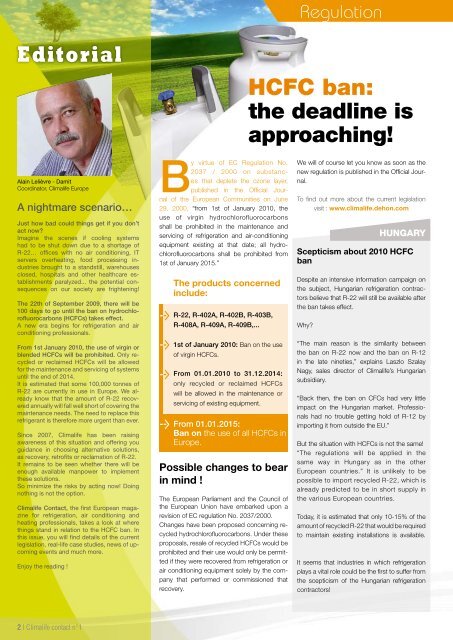Climalife Contact - Dehon - Climalife
Climalife Contact - Dehon - Climalife
Climalife Contact - Dehon - Climalife
You also want an ePaper? Increase the reach of your titles
YUMPU automatically turns print PDFs into web optimized ePapers that Google loves.
Editorial<br />
Alain Lelièvre - Damit<br />
Coordinator, <strong>Climalife</strong> Europe<br />
A nightmare scenario…<br />
Just how bad could things get if you don’t<br />
act now?<br />
Imagine the scenes if cooling systems<br />
had to be shut down due to a shortage of<br />
R-22… offices with no air conditioning, IT<br />
servers overheating, food processing industries<br />
brought to a standstill, warehouses<br />
closed, hospitals and other healthcare establishments<br />
paralyzed... the potential consequences<br />
on our society are frightening!<br />
The 22th of September 2009, there will be<br />
100 days to go until the ban on hydrochlorofluorocarbons<br />
(HCFCs) takes effect.<br />
A new era begins for refrigeration and air<br />
conditioning professionals.<br />
From 1st January 2010, the use of virgin or<br />
blended HCFCs will be prohibited. Only recycled<br />
or reclaimed HCFCs will be allowed<br />
for the maintenance and servicing of systems<br />
until the end of 2014.<br />
It is estimated that some 100,000 tonnes of<br />
R-22 are currently in use in Europe. We already<br />
know that the amount of R-22 recovered<br />
annually will fall well short of covering the<br />
maintenance needs. The need to replace this<br />
refrigerant is therefore more urgent than ever.<br />
Since 2007, <strong>Climalife</strong> has been raising<br />
awareness of this situation and offering you<br />
guidance in choosing alternative solutions,<br />
as recovery, retrofits or reclamation of R-22.<br />
It remains to be seen whether there will be<br />
enough available manpower to implement<br />
these solutions.<br />
So minimize the risks by acting now! Doing<br />
nothing is not the option.<br />
<strong>Climalife</strong> <strong>Contact</strong>, the first European magazine<br />
for refrigeration, air conditioning and<br />
heating professionals, takes a look at where<br />
things stand in relation to the HCFC ban. In<br />
this issue, you will find details of the current<br />
legislation, real-life case studies, news of upcoming<br />
events and much more.<br />
Enjoy the reading !<br />
2 I <strong>Climalife</strong> contact n°1<br />
By virtue of EC Regulation No.<br />
2037 / 2000 on substances<br />
that deplete the ozone layer,<br />
published in the Official Journal<br />
of the European Communities on June<br />
29, 2000, “from 1st of January 2010, the<br />
use of virgin hydrochlorofluorocarbons<br />
shall be prohibited in the maintenance and<br />
servicing of refrigeration and air-conditioning<br />
equipment existing at that date; all hydro-<br />
chlorofluorocarbons shall be prohibited from<br />
1st of January 2015.”<br />
The products concerned<br />
include:<br />
R-22, R-402A, R-402B, R-403B,<br />
R-408A, R-409A, R-409B,...<br />
1st of January 2010: Ban on the use<br />
of virgin HCFCs.<br />
From 01.01.2010 to 31.12.2014:<br />
only recycled or reclaimed HCFCs<br />
will be allowed in the maintenance or<br />
servicing of existing equipment.<br />
A From partir du 01.01.2015:<br />
01.01.2015 : interdiction<br />
totale Ban d’utiliser on the des use HCFC of all HCFCs en Euro- in<br />
pe. Europe.<br />
Possible changes to bear<br />
in mind !<br />
The European Parliament and the Council of<br />
the European Union have embarked upon a<br />
revision of EC regulation No. 2037/2000.<br />
Changes have been proposed concerning recycled<br />
hydrochlorofluorocarbons. Under these<br />
proposals, resale of recycled HCFCs would be<br />
prohibited and their use would only be permitted<br />
if they were recovered from refrigeration or<br />
air conditioning equipment solely by the company<br />
that performed or commissioned that<br />
recovery.<br />
Regulation<br />
HCFC ban:<br />
the deadline is<br />
approaching!<br />
We will of course let you know as soon as the<br />
new regulation is published in the Official Journal.<br />
To find out more about the current legislation<br />
visit : www.climalife.dehon.com<br />
Hungary<br />
Scepticism about 2010 HCFC<br />
ban<br />
Despite an intensive information campaign on<br />
the subject, Hungarian refrigeration contractors<br />
believe that R-22 will still be available after<br />
the ban takes effect.<br />
Why?<br />
“The main reason is the similarity between<br />
the ban on R-22 now and the ban on R-12<br />
in the late nineties,” explains Laszlo Szalay<br />
Nagy, sales director of <strong>Climalife</strong>’s Hungarian<br />
subsidiary.<br />
“Back then, the ban on CFCs had very little<br />
impact on the Hungarian market. Professio-<br />
nals had no trouble getting hold of R-12 by<br />
importing it from outside the EU.”<br />
But the situation with HCFCs is not the same!<br />
“The regulations will be applied in the<br />
same way in Hungary as in the other<br />
European countries.” It is unlikely to be<br />
possible to import recycled R-22, which is<br />
already predicted to be in short supply in<br />
the various European countries.<br />
Today, it is estimated that only 10-15% of the<br />
amount of recycled R-22 that would be required<br />
to maintain existing installations is available.<br />
It seems that industries in which refrigeration<br />
plays a vital role could be the first to suffer from<br />
the scepticism of the Hungarian refrigeration<br />
contractors!






